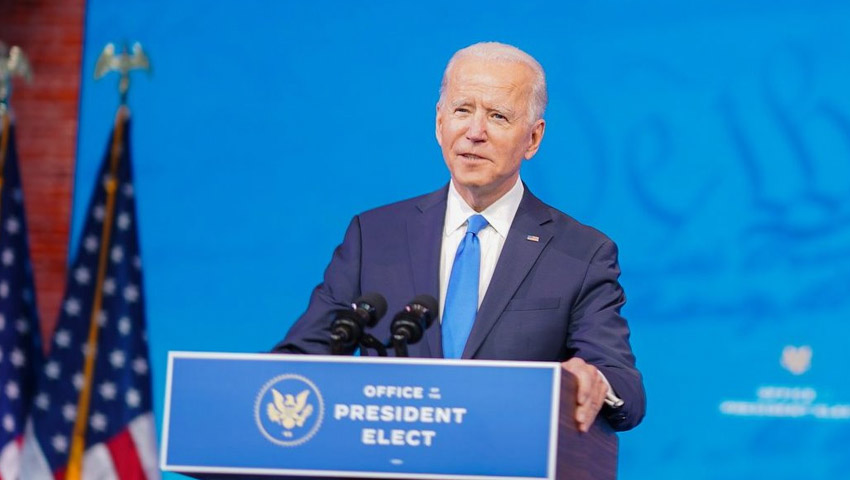US President Joe Biden has used his first few weeks in office to uproot much of his predecessor’s policy legacy, but according to a senior Lowy Institute analyst, the new administration won’t take an axe to Trump’s China policy.
To continue reading the rest of this article, please log in.
Create free account to get unlimited news articles and more!
Since assuming office on 20 January, US President Joe Biden has signed a record 25 executive orders, largely aimed at undoing the Trump administration’s hallmark policies.
The executive orders include moves to re-enter the Paris climate accord, halt construction of the border wall between the US and Mexico, and reinstate US membership of the World Health Organisation.
But according to Richard McGregor, senior fellow at the Lowy Institute, Biden’s partisan agenda won’t filter through to China policy.
McGregor pointed to the Biden cabinet’s swift support for the Trump administration's condemnation of war crimes committed by Beijing against Uighurs in Xinjiang, and the State Department’s hard-line stance on Taiwan.
The Lowy analyst said while Secretary of State Antony Blinken and National Security Advisor Jake Sullivan have not adopted the Trump team’s “highly ideological tone”, Beijing “should expect more continuity” in China policy from Washington.
McGregor argues that Biden recognises the importance of continuity amid a ramp in Chinese aggression.
“In the wake of COVID-19, which started in China but went on to devastate the health and economies of many other countries — most of all the United States — Beijing has bounced back strongly,” he writes.
“The upheaval in Washington during the transition from Trump to Biden has only confirmed the view of many in Beijing — that the China system works, while the US model is broken. One system has delivered for stability, the Chinese argue; the other, chaos, violence and instability.”
The senior fellow quotes Zhou Bo, a colonel with the People's Liberation Army's Academy of Military Science, who wrote in the South China Morning Post in late January: "China's rise so far has been peaceful, but can the United States' decline be equally peaceful?"
McGregor continues: “Underlying such trolling is the notion that Beijing would like countries —especially in Asia — to internalise: that China's rise is inevitable, and will unfold alongside US decline, and that everyone should cut their diplomatic cloth accordingly.”
However, McGregor claims that the 46th President of the United States would also seek to emerge from the “shadow” of the Obama administration, which critics accuse of being soft on China.
“Enter the Biden administration, which is staffed by many Obama veterans. Blinken, Sullivan, and the incoming co-ordinator for Indo-Pacific policy, Kurt Campbell, are all Obama alumni, as is Ely Ratner, who will be in charge of China policy in the Pentagon,” he says.
“The Obama administration has been criticised for failing to recognise the breadth of China's strategic ambitions and unnecessarily trading off progress on issues like climate change to allow Beijing a freer run in the South China Sea.”
McGregor notes that Obama administration officials had been “badly burned” in 2012, recalling an instance in which they thought they had negotiated a withdrawal of Chinese vessels from a disputed area near Scarborough Shoal adjacent to the Philippines.
“Manila withdrew its boats, while the Chinese vessels stayed on. Both Campbell and Ratner attended that meeting in a Virginia hotel room and have not forgotten,” he writes.
According to the Lowy analyst, the Biden administration is “acutely aware” of the perception that Trump’s stance on China “gained leverage over Beijing”, whereas they “missed their moment” during the Obama era.
“The statement on Taiwan released by the State Department on [23 January] was particularly significant in laying down markers on an issue that could define bilateral ties,” McGregor adds.
McGregor concluded by referencing a quote from Drew Thompson, former head of the office of China, Taiwan and Mongolia in the Pentagon from 2011 to 2018, who said he was “reassured” by the Biden administration’s reaffirmation of support for Taiwan.
"If you were concerned that the Biden administration would be Obama 2.0," he said in a tweet, "think again."
Get involved with the discussion and let us know your thoughts on Australia's future role and position in the Indo-Pacific region and what you would like to see from Australia's political leaders in terms of partisan and bipartisan agenda setting in the comments section below, or get in touch with
Charbel Kadib
News Editor – Defence and Security, Momentum Media
Prior to joining the defence and aerospace team in 2020, Charbel was news editor of The Adviser and Mortgage Business, where he covered developments in the banking and financial services sector for three years. Charbel has a keen interest in geopolitics and international relations, graduating from the University of Notre Dame with a double major in politics and journalism. Charbel has also completed internships with The Australian Department of Communications and the Arts and public relations agency Fifty Acres.

 Login
Login








